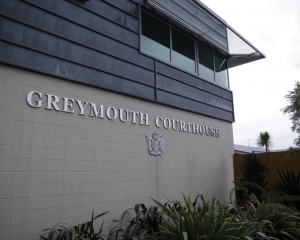
Shane Jones was in Franz Josef on Friday to formally mark the completion of stage 1 of the Waiho (Waiau) River flood protection scheme.
The co-funded project, built by the West Coast Regional Council for the local rating district ratepayers, was first mooted and funded in 2020 as part of a $24 million package. That followed the 2019 flood which washed away the State Highway 6 bridge and breached stopbanks protecting the Waiho Flat farming settlement on the south side of the river.
Stage 1 of that project, to rebuild and extend the north bank floodbanks, finally started in 2023 with $9.2m of government funding and was ticked off on Friday.
Meanwhile, the remainder of the original $24m package encompassing the south bank, at Waiho Flat, has been rendered unnecessary.
The West Coast Regional Council announced in May 2024 its preferred option to eventually abandon that farming settlement by removing the stopbanks to allow the river to fan out naturally — buying more time for the Franz Josef township, on the north bank.
That was based on a "master plan" concept, which it now says is the Westland District Council’s responsibility to lead.
Mr Jones told the Greymouth Star he was familiar with the challenges facing the area based on past visits and briefings.
He had also been "overwhelmed by maps and technical diagrams on the challenges".
"I haven’t had a detailed briefing on a master plan."
Mr Jones said there were a "plethora of areas like Franz Josef facing urgent solutions".
The removal of Matata in the Bay of Plenty a few years ago was a prime example.
"It’s painful — it’s expensive."
Mayor Helen Lash said she planned to broach finding a solution with the minister while he was in Franz.
The future plan had to be collaborative, she said.
Mr Jones said the $15m so far from the government was as a stop-gap measure.
But at this point there was no overarching solution from the government.
"This $15m is an input to stabilise the current situation but I realise it is a longer-term transition ... There’s other areas that are crying out for money."
But Mr Jones also acknowledged the small local government, with its paucity of resources, was challenged to deal with the issues.
At the same time "leadership has to come locally rather than being forced".
— Greymouth Star












